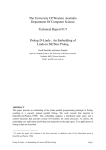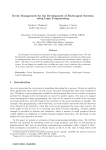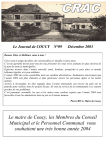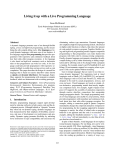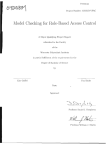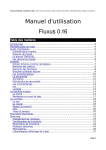Download REScala Reference Manual
Transcript
REScala Reference Manual Guido Salvaneschi Technical University of Darmstadt [email protected] May 2015 Version 0.3 1 Contents 1 Introduction 2 Signals and Vars 2.1 Vars . . . . . . . . . . . . . . . . 2.1.1 Defining Vars . . . . . . . 2.1.2 Assigning Vars . . . . . . 2.2 Signals . . . . . . . . . . . . . . . 2.2.1 Defining Signals . . . . . 2.2.2 Signal expressions . . . . 2.2.3 Accessing reactive values 2.3 Example: speed . . . . . . . . . . 3 4 5 1 . . . . . . . . . . . . . . . . . . . . . . . . . . . . . . . . . . . . . . . . . . . . . . . . . . . . . . . . . . . . . . . . . . . . . . . . . . . . . . . . . . . . . . . . . . . . . . . . . . . . . . . . . . . . . . . . . . . . . . . . . . . . . . . . . . . . . . . . . . . . . . . . . . . . . . . . 2 2 2 3 3 3 3 4 4 Events 3.1 Imperative events . . . . . . . . . . 3.1.1 Defining Events . . . . . . . 3.1.2 Registering Handlers . . . . 3.1.3 Firing Events . . . . . . . . 3.1.4 Unregistering Handlers . . . 3.2 Declarative Events . . . . . . . . . 3.2.1 Defining Declarative Events 3.3 Event Operators . . . . . . . . . . . 3.3.1 OR Events . . . . . . . . . 3.3.2 Predicate Events . . . . . . 3.3.3 Map Events . . . . . . . . . . . . . . . . . . . . . . . . . . . . . . . . . . . . . . . . . . . . . . . . . . . . . . . . . . . . . . . . . . . . . . . . . . . . . . . . . . . . . . . . . . . . . . . . . . . . . . . . . . . . . . . . . . . . . . . . . . . . . . . . . . . . . . . . . . . . . . . . . . . . . . . . . . . . . . . . . . . . . . . . . . . . . . . . . . . . . . . . . . . . . . . . . . . . . . . . . . . . . . . 5 5 5 6 6 7 7 7 8 8 8 8 Conversion Functions 4.1 Basic Conversion Functions . . . 4.1.1 Event to Signal: Latest . . 4.1.2 Signal to Event: Changed 4.2 Advanced Conversion Functions . 4.2.1 Fold . . . . . . . . . . . . 4.2.2 Iterate . . . . . . . . . . . 4.2.3 LatestOption . . . . . . . 4.2.4 Last . . . . . . . . . . . . 4.2.5 List . . . . . . . . . . . . 4.2.6 Count . . . . . . . . . . . 4.2.7 Snapshot . . . . . . . . . 4.2.8 Change . . . . . . . . . . 4.2.9 ChangedTo . . . . . . . . 4.2.10 Reset . . . . . . . . . . . 4.2.11 Switch/toggle . . . . . . . 4.2.12 Unwrap . . . . . . . . . . . . . . . . . . . . . . . . . . . . . . . . . . . . . . . . . . . . . . . . . . . . . . . . . . . . . . . . . . . . . . . . . . . . . . . . . . . . . . . . . . . . . . . . . . . . . . . . . . . . . . . . . . . . . . . . . . . . . . . . . . . . . . . . . . . . . . . . . . . . . . . . . . . . . . . . . . . . . . . . . . . . . . . . . . . . . . . . . . . . . . . . . . . . . . . . . . . . . . . . . . . . . . . . . . . . . . . . . . . . . . . . . . . . . . . . . . . . . . . . . . . . . . . . . . . . . . . . . . . . . . . . . . . . . . . . . . . . . . . . . . . . . . . . . . 9 9 9 9 10 10 11 11 11 12 12 12 13 13 13 14 14 Common Pitfalls 5.1 Accessing values in signal expressions 5.2 Attempting to assign a signal . . . . . 5.3 Side effects in signal expressions . . . 5.4 Cyclic dependencies . . . . . . . . . . . . . . . . . . . . . . . . . . . . . . . . . . . . . . . . . . . . . . . . . . . . . . . . . . . . . . . . . . . . . . . . . . . . . 15 15 15 15 16 I . . . . . . . . . . . . . . . . 5.5 5.6 Objects and mutability . . . . . . . . . . . . . . . . . . . . . . . . . Functions of reactive values . . . . . . . . . . . . . . . . . . . . . . . 16 17 6 Technicalities 6.1 Imports and dependencies . . . . . . . . . . . . . . . . . . . . . . . . 18 18 7 Essential Related Work 19 8 Acknowledgments 20 II 1 Introduction This manual covers the main features of the RES CALA programming language. Section 2 presents time-changing values in RES CALA, Section 3 describes events, Section 4 covers the conversion functions between events and time-changing values, Section 6 presents technical details that are necessary to correctly run RES CALA, Section 7 outlines the related work. Intended audience and prerequisites This manuscript is mainly intended for students who approach reactive programming in Scala for the first time. The manual assumes basic knowledge of the Scala [9] language and of functional programming (high-order functions, anonymous functions, etc.). No previous knowledge of reactive programming is assumed. While a major aspect of RES CALA’s design is the integration of events and signals, they can be used separately. For example a programmer can use only RES CALA events to design application that do not need time-changing values. Scope The manual covers the basic features of RES CALA. Some functionalities, including implicit events and high-order signals are intentionally not covered, other, like event polymorphism, are only sketched. More details can be found in [7, 3]. The manual introduces the concepts related to functional reactive programming and event-based programming from a practical perspective. The readers interested in a more general presentation of these topics can find in Section 7 the essential references. 1 2 Signals and Vars A signal is language concept for expressing functional dependencies among values in a declarative way. Intuitively, a reactive value can depend on variables – sources of change without further dependencies – or on other reactive values. When any of the dependency sources changes, the expression defining the reactive value is automatically recomputed by the language runtime to keep the reactive value up-to-date. Consider the following example: 1 2 3 4 5 6 7 8 var a = 2 var b = 3 var c = a + b println(a,b,c) // −> (2,3,5) a = 4 println(a,b,c) // −> (2,4,5) c = a + b println(a,b,c) // −> (4,3,7) Line 3 specifies the value of c as a function of a and b. Since Line 3 defines a statement, the relation c = a + b is valid after the execution of Line 3. Clearly, when the value of a is updated, the relation c = a + b is not valid anymore (Line 6). To make sure that the relation still holds, the programmer needs to recompute the expression and reassign c, like in line 7. Reactive programming and RES CALA provide abstractions to express constraints in addition to statements. In RES CALA, the programmer can specify that the constraint c := a + b always holds during the execution of a program. Every time a or b change, the value of c is automatically recomputed. For example: 1 2 3 4 5 6 val a = Var(2) val b = Var(3) val c = Signal{ a() + b() } println(a.get,b.get,c.get) // −> (2,3,5) a()= 4 println(a.get,b.get,c.get) // −> (4,3,7) In the code above, the signal in Line 3 defines the constraint c := a + b. When one of the reactive values involved in the constraint is updated (Line 5), the expression in the constraint is recomputed behind the scenes, and the value of a is automatically updated. As the reader may have noticed, expressing constraints in RES CALA requires to conform some syntactic conventions which are discussed in the next sections. 2.1 Vars 2.1.1 Defining Vars Programmers express reactive computations starting from vars. Vars wrap normal Scala values. For example, Var(2) creates a var with an [Int] value and initializes the var to the value 2. Vars are parametric types. A var that carries integer values has type Var[Int]. The following code snippet shows valid var declarations. 1 2 3 4 val val val val a = Var(0) b = Var("Hello World") c = Var(false) d: Var[Int] = Var(30) 2 5 6 val e: Var[String] = Var("REScala") val f: Var[Boolean] = Var(false) 2.1.2 Assigning Vars Vars can be directly modified with the ()= operator. For example v()=3 replaces the current value of the v var with 3. Therefore, vars are changed imperatively by the programmer. 2.2 Signals 2.2.1 Defining Signals Signals are defined by the syntax Signal{sigexpr}, where sigexpr is a side effect-free expression. Signals are parametric types. A signal that carries integer values has the type Signal[Int]. 2.2.2 Signal expressions When, inside a signal expression defining a signal s, a var or a signal is called with the () operator, the var or the signal are added to the values s depends on. In that case, s is a dependency of the vars and the signals in the signal expression. For example in the code snippet: 1 2 3 val a = Var(0) val b = Var(0) val s = Signal{ a() + b() } // Multiple vars in a signal expression The signal s is a dependency of the vars a and b, meaning that the values of s depends on both a and b. The following code snippets define valid signal declarations. 1 2 3 4 5 6 7 1 2 3 4 1 2 3 4 5 6 7 val val val val val val val a = Var(0) b = Var(0) c = Var(0) r: Signal[Int] = Signal{ a() + 1 } // Explicit type in var decl s = Signal{ a() + b() } // Multiple vars is a signal expression t = Signal{ s() ∗ c() + 10 } // Mix signals and vars in signal expressions u = Signal{ s() ∗ t() } // A signal that depends on other signals val val val val a b c s = = = = Var(0) Var(2) Var(true) Signal{ if (c()) a() else b() } def factorial(n: Int) = ... val a = Var(0) val s: Signal[Int] = Signal{ // A signal expression can be any code block val tmp = a() ∗ 2 val k = factorial(tmp) k + 2 // Returns an Int } 3 2.2.3 Accessing reactive values The current value of a signal or a var can be accessed using the get method. For example: 1 2 3 4 5 6 7 8 9 val a = Var(0) val b = Var(2) val c = Var(true) val s: Signal[Int] = Signal{ a() + b() } val t: Signal[Boolean] = Signal{ !c() } val x: Int = a.get val y: Int = s.get val z: Boolean = t.get println(z) 2.3 Example: speed The following example computes the displacement space of a particle that is moving at constant speed SPEED. The application prints all the values associated to the displacement over time. 1 2 3 val SPEED = 10 val time = Var(0) val space = Signal{ SPEED ∗ time() } 4 5 space.changed += ((x: Int) => println(x)) 6 7 8 9 10 while (true) { Thread sleep 20 time() = time.get + 1 } 11 12 13 14 15 16 17 −− output −− 10 20 30 40 ... The application behaves as follows. Every 20 milliseconds, the value of the time var is increased by 1 (Line 9). When the value of the time var changes, the signal expression at Line 3 is reevaluated and the value of space is updated. Finally, the current value of the space signal is printed every time the value of the signal changes. Printing the value of a signal deserves some more considerations. Technically, this is achieved by converting the space signal to an event that is fired every time the signal changes its value (Line 5). The conversion is performed by the changed operator. The += operator attaches an handler to the event returned by the changed operator. When the event fires, the handler is executed. Line 5 is equivalent to the following code: 1 2 3 val e: Event[Int] = space.changed val handler: (Int => Unit) = ((x: Int) => println(x)) e += handler Note that using println(space.get) would also print the value of the signal, but only at the point in time in which the print statement is executed. Instead, the approach described so far prints all values of the signal. More details about converting signals into events and back are provided in Section 4. 4 3 Events RES CALA supports different kind of events. Imperative events are directly triggered from the user. Declarative events trigger when the events they depend on trigger. In reactive applications, events are typically used to model changes that happen at discrete points in time. For example a mouse click from the user or the arrival of a new network packet. Some features of RES CALA events are valid for all event types. • Events carry a value. The value is associated to the event when the event is fired and received by all the registered handlers when each handler is executed. • Events are generic types parametrized with the type of value they carry, like Event[T] and ImpertiveEvent[T] where T is the value carried by the event. • Both imperative events and declarative events are subtypes of Event[T] and can referred to generically. 3.1 Imperative events RES CALA imperative events are triggered imperatively by the programmer. One can think to imperative events as a generalization of a method call which supports (multiple) bodies that are registered and unregistered dynamically. 3.1.1 Defining Events Imperative events are defined by the ImperativeEvent[T] type. The value of the parameter T defines the value that is attached to the event. An event with no parameter attached has signature ImpertiveEvent[Unit]. The following code snippet show valid events definitions: 1 2 3 4 5 6 7 val e1 = new ImperativeEvent[Unit]() val e2 = new ImperativeEvent[Int]() val e3 = new ImperativeEvent[String]() val e4 = new ImperativeEvent[Boolean]() val e5: ImperativeEvent[Int] = new ImperativeEvent[Int]() class Foo val e6 = new ImperativeEvent[Foo]() It is possible to attach more than one value to the same event. This is easily accomplished by using a tuple as a generic parameter type. For example: 1 2 3 4 5 val val val val val e1 = new ImperativeEvent[(Int,Int)]() e2 = new ImperativeEvent[(String,String)]() e3 = new ImperativeEvent[(String,Int)]() e4 = new ImperativeEvent[(Boolean,String,Int)]() e5: ImperativeEvent[(Int,Int)] = new ImperativeEvent[(Int,Int)]() Note that an imperative event is also an event. Therefore the following declaration is also valid: 1 val e1: Event[Int] = new ImperativeEvent[Int]() 5 3.1.2 Registering Handlers Handlers are code blocks that are executed when the event fires. The += operator attaches the handler to the event. The handler is a first class function that receives the attached value as a parameter. The following are valid handler definitions. 1 2 3 4 5 6 7 8 9 var state = 0 val e = new ImperativeEvent[Int]() e += { println( ) } e += (x => println(x)) e += ((x: Int) => println(x)) e += (x => { // Multiple statements in the handler state = x println(x) }) The signature of the handler must conform the signature of the event, since the handler is supposed to process the attached value and perform side effects. For example is the event is of type Event[(Int,Int)] the handler must be of type (Int,Int) => Unit. 1 2 3 4 5 6 7 8 val e = new ImperativeEvent[(Int,String)]() e += (x => { println(x. 1) println(x. 2) }) e += ((x: (Int,String)) => { println(x) }) Note that events without arguments still need an argument in the handler. 1 2 3 val e = new ImperativeEvent[Int]() e += { x => println() } e += { (x: Int) => println() } Scala allows one to refer to a method using the partially applied function syntax. This approach can be used to directly register a method as an event handler. For example: 1 2 3 4 5 6 7 def m1(x: Int) = { val y = x + 1 println(y) } val e = new ImperativeEvent[Int] e += m1 e(10) 3.1.3 Firing Events Events can be fired with the same syntax of a method call. When an event is fired, a proper value must be associated to the event call. Clearly, the value must conform the signature of the event. For example: 1 2 3 4 5 6 val e1 = new ImperativeEvent[Int]() val e2 = new ImperativeEvent[Boolean]() val e3 = new ImperativeEvent[(Int,String)]() e1(10) e2(false) e3((10,"Hallo")) 6 When a handler is registered to an event, the handler is executed every time the event is fired. The actual parameter is provided to the handler. 1 2 3 4 5 6 7 val e = new ImperativeEvent[Int]() e += { x => println(x) } e(10) e(10) −− output −−−− 10 10 If multiple handlers are registered, all of them are executed when the event is fired. Applications should not rely on any specific execution order for handler execution. 1 2 3 4 5 6 7 8 9 10 val e = new ImperativeEvent[Int]() e += { x => println(x) } e += { x => println(f"n: $x")} e(10) e(10) −− output −−−− 10 n: 10 10 n: 10 3.1.4 Unregistering Handlers Handlers can be unregistered from events with the -= operator. When a handler is unregistered, it is not executed when the event is fired. 1 2 3 val e = new ImperativeEvent[Int]() val handler1 = { x: Int => println(x) } val handler2 = { x: Int => println(s"n: $x") } 4 5 6 7 8 9 10 11 e += handler1 e += handler2 e(10) e −= handler2 e(10) e −= handler1 e(10) 12 13 14 15 16 −− output −−−− 10 n: 10 10 3.2 Declarative Events RES CALA supports declarative events, which are defined as a combination of other events. For this purpose it offers operators like e1 ||e2 , e1 &&p , e1 .map(f ). Event composition allows to express the application logic in a clear and declarative way. Also, the update logic is better localized because a single expression models all the sources and the transformations that define an event occurrence. 3.2.1 Defining Declarative Events Declarative events are defined by composing other events. The following code snippet shows some examples of valid definitions for declarative events. 7 1 2 val e1 = new ImperativeEvent[Int]() val e2 = new ImperativeEvent[Int]() 3 4 5 6 val e3 = e1 | | e2 val e4 = e1 && ((x: Int)=> x>10) val e5 = e1 map ((x: Int)=> x.toString) 3.3 Event Operators This section presents in details the operators that allow one to compose events into declarative events. 3.3.1 OR Events The event e1 ||e2 is fired upon the occurrence of one among e1 or e2 . Note that the events that appear in the event expression must have the same parameter type (Int in the next example). 1 2 3 4 5 6 7 8 9 val e1 = new ImperativeEvent[Int]() val e2 = new ImperativeEvent[Int]() val e1 OR e2 = e1 | | e2 e1 OR e2 += ((x: Int) => println(x)) e1(1) e2(2) −− output −−−− 1 2 3.3.2 Predicate Events The event e&&p is fired if e occurs and the predicate p is satisfied. The predicate is a function that accepts the event parameter as a formal parameter and returns Boolean. In other words the && operator filters the events according to their parameter and a predicate. 1 2 3 4 5 6 7 val e = new ImperativeEvent[Int]() val e AND: Event[Int] = e && ((x: Int) => x>10) e AND += ((x: Int) => println(x)) e(5) e(15) −− output −−−− 15 3.3.3 Map Events The event e mapf is obtained by applying f to the value carried by e. The map function must take the event parameter as a formal parameter. The return type of the map function is the type parameter value of the resulting event. 1 2 3 4 5 6 7 8 val e = new ImperativeEvent[Int]() val e MAP: Event[String] = e map ((x: Int) => x.toString) e MAP += ((x: String) => println(s"Here: $x")) e(5) e(15) −− output −−−− Here: 5 Here: 15 8 Figure 1: Basic conversion functions. 4 Conversion Functions RES CALA provides functions that interface signals and events. Conversion functions are fundamental to introduce time-changing values into OO applications – which are usually event-based. 4.1 Basic Conversion Functions This section covers the basic conversions between signals and events. Figure 1 shows how basic conversion functions can bridge signals and events. Events (Figure 1, left) occur at discrete point in time (x axis) and have an associate value (y axis). Signals, instead, hold a value for a continuous interval of time (Figure 1, right). The latest conversion functions creates a signal from an event. The signal holds the value associated to an event. The value is hold until the event is fired again and a new value is available. The changed conversion function creates an event from a signal. The function fires a new event every time a signal changes its value. 4.1.1 Event to Signal: Latest Returns a signal holding the latest value of the event e. The initial value of the signal is set to init. latest[T](e: Event[T], init: T): Signal[T] Example: 1 2 3 4 5 6 7 8 9 val e = new ImperativeEvent[Int]() val s: Signal[Int] = e.latest(10) assert(s.get == 10) e(1) assert(s.get == 1) e(2) assert(s.get == 2) e(1) assert(s.get == 1) 4.1.2 Signal to Event: Changed The changed function applies to a signal and returns an event that is fired every time the signal changes its value. 9 changed[U >: T]: Event[U] Example: 1 2 3 4 5 6 7 8 9 var test = 0 val v = Var(1) val s = Signal{ v() + 1 } val e: Event[Int] = s.changed e += ((x:Int)=>{test+=1}) v.set(2) assert(test == 1) v.set(3) assert(test == 2) 4.2 Advanced Conversion Functions Some of the conversion functions can be called on a signal providing an event as the first parameter or can be called on an event providing a signal as the first parameter. While the behavior is the same, the signature of the function is obviously different. For example, the function snapshot can return a signal that is updated on an event occurrence. Hence, the function can be exposed both on the Signal and the Event interface. For example: 1 2 val e: Event[V] = ... // An event val s: Signal[V] = ... // A signal 3 4 5 e.snapshot[V](s: Signal[V]): Signal[V] s.snapshot[V](e : Event[ ]): Signal[V] For simplicity, in those cases, we document the signature of the function with all the interested objects in the parameters. For example: 1 def snapshot[V](e : Event[ ], s: Signal[V]): Signal[V] 4.2.1 Fold The fold function creates a signal by folding events with a given function. Initially the signal holds the init value. Every time a new event arrives, the function f is applied to the previous previous value of the signal and to the value associated to the event. The result is the new value of the signal. fold[T,A](e: Event[T], init: A)(f :(A,T)=>A): Signal[A] Example: 1 2 3 4 5 6 val e = new ImperativeEvent[Int]() val f = (x:Int,y:Int)=>(x+y) val s: Signal[Int] = e.fold(10)(f) e(1) e(2) assert(s.get == 13) 10 4.2.2 Iterate Returns a signal holding the value computed by f on the occurrence of an event. Differently from fold, there is no carried value, i.e. the value of the signal does not depend on the current value but only on the accumulated value. iterate[A](e: Event[ ], init: A)(f: A=>A): Signal[A] Example: 1 2 3 4 5 6 7 8 9 10 11 12 13 var test: Int = 0 val e = new ImperativeEvent[Int]() val f = (x:Int)=>{test=x; x+1} val s: Signal[Int] = e.iterate(10)(f) e(1) assert(test == 10) assert(s.get == 11) e(2) assert(test == 11) assert(s.get == 12) e(1) assert(test == 12) assert(s.get == 13) 4.2.3 LatestOption The latestOption function is a variant of the latest function which uses the Option type to distinguish the case in which the event did not fire yet. Holds the latest value of an event as Some(val) or None. latestOption[T](e: Event[T]): Signal[Option[T]] Example: 1 2 3 4 5 6 7 8 9 val e = new ImperativeEvent[Int]() val s: Signal[Option[Int]] = e.latestOption assert(s.get == None) e(1) assert(s.get == Option(1)) e(2) assert(s.get == Option(2)) e(1) assert(s.get == Option(1)) 4.2.4 Last The last function generalizes the latest function and returns a signal which holds the last n events. last[T](e: Event[T], n: Int): Signal[List[T]] Initially, an empty list is returned. Then the values are progressively filled up to the size specified by the programmer. Example: 1 2 val e = new ImperativeEvent[Int]() val s: Signal[List[Int]] = e.last(5) 11 3 4 5 6 7 8 assert(s.get == List()) e(1) assert(s.get == List(1)) e(2) assert(s.get == List(1,2)) 9 10 11 12 13 e(3);e(4);e(5) assert(s.get == List(1,2,3,4,5)) e(6) assert(s.get == List(2,3,4,5,6)) 4.2.5 List Collects the event values in a (growing) list. This function should be used carefully. Since the entire history of events is maintained, the function can potentially introduce a memory overflow. list[T](e: 4.2.6 Event[T]): Signal[List[T]] Count Returns a signal that counts the occurrences of the event. Initially, when the event has never been fired yet, the signal holds the value 0. The argument of the event is simply discarded. count(e: 1 2 3 4 5 6 Event[ ]): Signal[Int] val e = new ImperativeEvent[Int]() val s: Signal[Int] = e.count assert(s.get == 0) e(1) e(3) assert(s.get == 2) 4.2.7 Snapshot Returns a signal updated only when e fires. If s in the meanwhile changes its value, the change is ignored. When the event e fires, the resulting signal is updated to the current value of s. snapshot[V](e : Event[ ], s: Signal[V]): Signal[V] Example: 1 2 3 4 5 6 7 8 9 10 val e = new ImperativeEvent[Int]() val v = Var(1) val s1 = Signal{ v() + 1 } val s = e.snapshot(s1) e(1) assert(s.get == 2) v.set(2) assert(s.get == 2) e(1) assert(s.get == 3) 12 4.2.8 Change The change function is similar to changed, but it provides both the old and the new value of the signal in a tuple. change[U >: T]: Event[(U, U)] Example: 1 2 3 val s = Signal{ ... } val e: Event[(Int,Int)] = s.change e += ((x:(Int,Int))=>{ ... }) 4.2.9 ChangedTo The changedTo function is similar to changed, but it fires an event only when the signal changes its value to a given value. changedTo[V](value: 1 2 3 4 5 V): Event[Unit] var test = 0 val v = Var(1) val s = Signal{ v() + 1 } val e: Event[Unit] = s.changedTo(3) e += ((x:Unit)=>{test+=1}) 6 7 8 9 10 11 assert(test == 0) v set(2) assert(test == 1) v set(3) assert(test == 1) 4.2.10 Reset When the reset function is called for the first time, the init value is used by the factory to determine the signal returned by the reset function. When the event occurs the factory is applied to the event value to determine the new signal. reset[T,A](e: Event[T], init: T)(factory: Example: 1 2 3 4 5 val val val val val e = new ImperativeEvent[Int]() v1 = Var(0) v2 = Var(10) s1 = Signal{ v1() + 1 } s2 = Signal{ v2() + 1 } 6 7 8 9 10 11 def factory(x: Int) = x%2 match { case 0 => s1 case 1 => s2 } val s3 = e.reset(100)(factory) 12 13 14 assert(s3.get == 1) v1.set(1) 13 (T)=>Signal[A]): Signal[A] 15 16 17 18 19 assert(s3.get == 2) e(101) assert(s3.get == 11) v2.set(11) assert(s3.get == 12) 4.2.11 Switch/toggle The toggle function switches alternatively between the given signals on the occurrence of an event e. The value attached to the event is simply discarded. toggle[T](e : Event[ ], a: Signal[T], b: Signal[T]): Signal[T] The switchTo function switches the value of the signal on the occurrence of the event e. The resulting signal is a constant signal whose value is the value carried by the event e. switchTo[T](e : Event[T], original: Signal[T]): Signal[T] The switchOnce function switches to a new signal provided as a parameter, once, on the occurrence of the event e. switchOnce[T](e: Signal[T] 4.2.12 Event[ ], original: Signal[T], newSignal: Signal[T]): Unwrap The unwrap function is used to “unwrap” an event inside a signal. def unwrap[T](wrappedEvent: Signal[Event[T]]): Event[T] It can, for instance, be used to detect if any signal within a collection of signals fired a changed event: 1 2 3 val collection: List[Signal[ ]] = ... val innerChanges = Signal {collection().map( .changed).reduce((a, b) => a | | b)} val anyChanged = innerChanges.unwrap 14 5 Common Pitfalls In this section we collect the most common pitfalls for users that are new to reactive programming and RES CALA. 5.1 Accessing values in signal expressions The () operator used on a signal or a var, inside a signal expression, returns the signal/var value and creates a dependency. The get operator returns the current value but does not create a dependency. For example the following signal declaration creates a dependency between a and s, and a dependency between b and s. 1 val s = Signal{ a() + b() } The following code instead establishes only a dependency between b and s. 1 val s = Signal{ a.get + b() } In other words, in the last example, if a is updated, s is not automatically updated. With the exception of the rare cases in which this behavior is desirable, using get inside a signal expression is almost certainly a mistake. As a rule of dumb, signals and vars appear in signal expressions with the () operator. 5.2 Attempting to assign a signal Signals are not assignable. Signal depends on other signals and vars, the dependency is expressed by the signal expression. The value of the signal is automatically updated when one of the values it depends on changes. Any attempt to set the value of a signal manually is a mistake. 5.3 Side effects in signal expressions Signal expressions should be pure. i.e. they should not modify external variables. For example the following code is conceptually wrong because the variable c is imperatively assigned form inside the signal expression (Line 4). 1 2 3 4 5 6 7 var c = 0 val s = Signal{ val sum = a() + b(); c = sum ∗ 2 } ... foo(c) /∗ WRONG − DON’T DO IT ∗/ A possible solution is to refactor the code above to a more functional style. For example, by removing the variable c and replacing it directly with the signal. 1 2 3 4 5 6 val c = Signal{ val sum = a() + b(); sum ∗ 2 } ... foo(c.get) 15 5.4 Cyclic dependencies When a signal s is defined, a dependency is establishes with each of the signals or vars that appear in the signal expression of s. Cyclic dependencies produce a runtime error and must be avoided. For example the following code: 1 2 3 val a = Var(0) /∗ WRONG − DON’T DO IT ∗/ val s = Signal{ a() + t() } val t = Signal{ a() + s() + 1 } creates a mutual dependency between s and t. Similarly, indirect cyclic dependencies must be avoided. 5.5 Objects and mutability Vars and signals may behave unexpectedly with mutable objects. Consider the following example. 1 2 3 4 /∗ WRONG − DON’T DO IT ∗/ class Foo(init: Int){ var x = init } val foo = new Foo(1) 5 6 7 8 9 10 val varFoo = Var(foo) val s = Signal{ varFoo().x + 10 } // s.get == 11 foo.x = 2 // s.get == 11 One may expect that after increasing the value of foo.x in Line 9, the signal expression is evaluated again and updated to 12. The reason why the application behaves differently is that signals and vars hold references to objects, not the objects themselves. When the statement in Line 9 is executed, the value of the x field changes, but the reference hold by the varFoo var is the same. For this reason, no change is detected by the var, the var does not propagate the change to the signal, and the signal is not reevaluated. A solution to this problem is to use immutable objects. Since the objects cannot be modified, the only way to change a filed is to create an entirely new object and assign it to the var. As a result, the var is reevaluated. 1 2 class Foo(x: Int){} val foo = new Foo(1) 3 4 5 6 7 8 val varFoo = Var(foo) val s = Signal{ varFoo().x + 10 } // s.get == 11 varFoo()= newFoo(2) // s.get == 12 Alternatively, one can still use mutable objects but assign again the var to force the reevaluation. However this style of programming is confusing for the reader and should be avoided when possible. 1 2 3 4 class Foo(init: Int){ var x = init } val foo = new Foo(1) /∗ WRONG − DON’T DO IT ∗/ 5 6 7 val varFoo = Var(foo) val s = Signal{ varFoo().x + 10 } 16 8 9 10 11 // s.get == 11 foo.x = 2 varFoo()=foo // s.get == 11 5.6 Functions of reactive values Functions that operate on traditional values are not automatically transformed to operate on signals. For example consider the following functions: 1 def increment(x: Int): (Int=>Int) = x + 1 The following code does not compile because the compiler expects an integer, not a var as a parameter of the increment function. In addition, since the increment function returns an integer, b has type Int, and the call b() in the signal expression is also rejected by the compiler. 1 2 3 val a = Var(1) /∗ WRONG − DON’T DO IT ∗/ val b = increment(a) val s = Signal{ b() + 1 } The following code snippet is syntactically correct, but the signal has a constant value 2 and is not updated when the var changes. 1 2 3 val a = Var(1) val b = increment(a.get) val s = Signal{ b + 1 } The following solution is syntactically correct and the signal s is updated every time the var a is updated. 1 2 val a = Var(1) val s = Signal{ increment(a()) + 1 } 17 6 Technicalities This section is meant to cover the implementation details of RES CALA that are necessary to correctly run the current the library. 6.1 Imports and dependencies To work with RES CALA programmers need to properly import the reactive abstractions offered by the language. The following imports are normally sufficient for all the basic functionalities of RES CALA: 1 2 3 import rescala. import rescala.events. import makro.SignalMacro.{SignalM => Signal} Note that signal expressions are currently implemented as macros, i.e. the body of a signal expression is analyzed to detect the reactive values and establish the dependencies. To use macros for signal expressions, the macro SignalM is imported and renamed to Signal (Line 3). 18 7 Essential Related Work A more academic presentation of RES CALA is in [7]. A complete bibliography on reactive programming is beyond the scope of this work. The interested reader can refer to [1] for an overview of reactive programming and to [8] for the issues concerning the integration of RP with object-oriented programming. RES CALA builds on ideas originally developed in EScala [3] – which supports event combination and implicit events. Other reactive languages directly represent timechanging values and remove inversion of control. Among the others, we mention FrTime [2] (Scheme), FlapJax [6] (Javascript), AmbientTalk/R [4] and Scala.React [5] (Scala). 19 8 Acknowledgments Several people contributed to this manual with their ideas and comments. Among the others Gerold Hintz and Pascal Weisenburger. 20 References [1] E. Bainomugisha, A. Lombide Carreton, T. Van Cutsem, S. Mostinckx, and W. De Meuter. A survey on reactive programming. ACM Comput. Surv. (To appear), 2013. [2] G. H. Cooper and S. Krishnamurthi. Embedding dynamic dataflow in a call-byvalue language. In ESOP, pages 294–308, 2006. [3] V. Gasiunas, L. Satabin, M. Mezini, A. Núñez, and J. Noyé. EScala: modular event-driven object interactions in Scala. AOSD ’11, pages 227–240. ACM, 2011. [4] A. Lombide Carreton, S. Mostinckx, T. Cutsem, and W. Meuter. Loosely-coupled distributed reactive programming in mobile ad hoc networks. In J. Vitek, editor, Objects, Models, Components, Patterns, volume 6141 of Lecture Notes in Computer Science, pages 41–60. Springer Berlin Heidelberg, 2010. [5] I. Maier and M. Odersky. Deprecating the Observer Pattern with Scala.react. Technical report, 2012. [6] L. A. Meyerovich, A. Guha, J. Baskin, G. H. Cooper, M. Greenberg, A. Bromfield, and S. Krishnamurthi. Flapjax: a programming language for ajax applications. OOPSLA ’09, pages 1–20. ACM, 2009. [7] G. Salvaneschi, G. Hintz, and M. Mezini. REScala: Bridging between objectoriented and functional style in reactive applications. In Proceedings of the 13th International Conference on Aspect-Oriented Software Development, AOSD ’14, New York, NY, USA, Accepted for publication, 2014. ACM. [8] G. Salvaneschi and M. Mezini. Reactive behavior in object-oriented applications: an analysis and a research roadmap. In Proceedings of the 12th annual international conference on Aspect-oriented software development, AOSD ’13, pages 37–48, New York, NY, USA, 2013. ACM. [9] Scala site. http://www.scala-lang.org/. 21




























